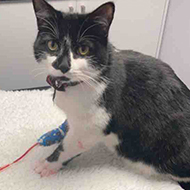
Charity urges owners to be aware of the risks that certain products pose to pets.
The RSPCA has issued a warning to cat owners about the dangers that lilies can pose to their pets after the death of a cat in Croydon.
Mya Sweeney, who lives in Croydon, contacted the RSPCA Croydon, Crystal Palace and District branch when her nine-month-old kitten named Jasper had become poisoned by a bunch of lilies that she had been gifted.
She said: “I don’t know whether Jasper brushed up against them or perhaps ate some of the lilies’ pollen but he started to go off his food for a couple of days. Jasper has always been a bit of a fussy eater so I wasn't too worried but by the third day he started to become poorly. I took him to the vets and they did some blood tests and the vet confirmed that he was suffering from lily poisoning.
“I had no idea they were toxic to cats. I think there needs to be a change in the law which means it should be clearly labelled on the flowers that they can poison cats.”
Sadly, Jasper did not pull through and Ms Sweeney was left devastated by the loss of the pet that had helped her through lockdown.
The RSPCA Croydon branch helped Ms Sweeney with the cost of some of Jasper’s vet treatment and is now helping her to raise awareness about the dangers of lilies to both cats and dogs.
Jacqui Jackson, RSPCA Croydon branch manager, said: “We would always advise pet owners to check whether products or items they are bringing into their homes could be toxic to their pets as there are many different types of plants found in the home and garden which can be harmful to pets.”
Image (c) RSPCA.



 The Veterinary Medicines Directorate (VMD) is inviting applications from veterinary students to attend a one-week extramural studies (EMS) placement in July 2026.
The Veterinary Medicines Directorate (VMD) is inviting applications from veterinary students to attend a one-week extramural studies (EMS) placement in July 2026.